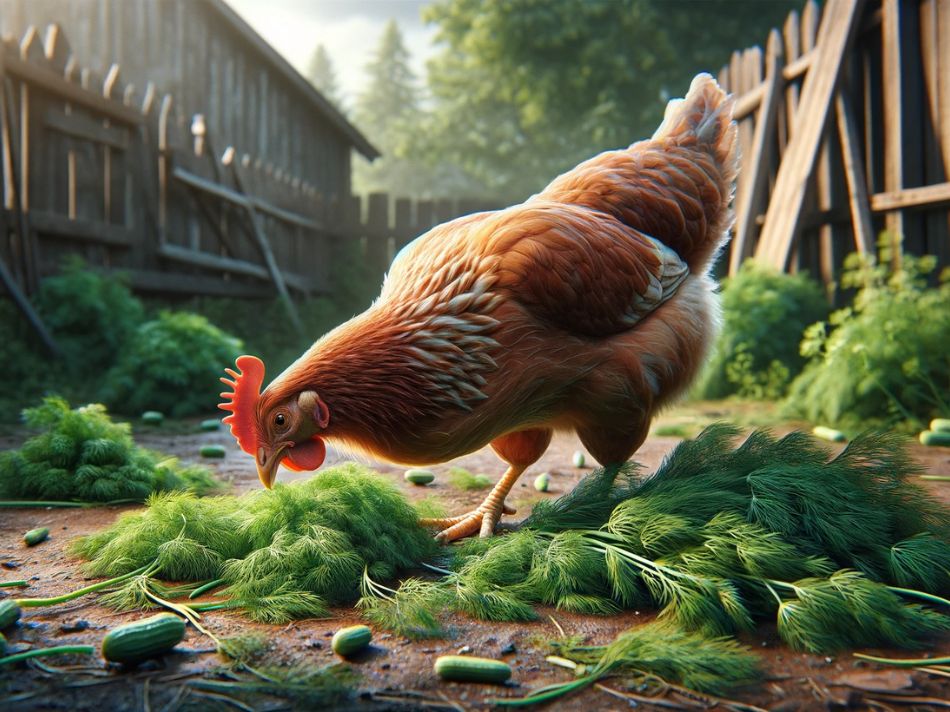Chickens are omnivores, meaning they can eat a variety of foods, from seeds and vegetables to insects and small animals. They enjoy a diverse diet which includes grains, greens, fruits, and even kitchen scraps. In terms of herbs, a common question arises: Can chickens eat dill?
Yes, chickens can safely eat dill. This herb is not toxic to them and can be a healthy addition to their diet. It provides various nutrients and can be a flavorful treat for your flock. However, it should be given in moderation as part of a balanced diet.
Discover the benefits and potential risks of feeding dill to your chickens. We’ll explore how often dill can be safely fed, its nutritional composition, and the proper ways to include it in your chickens’ diet.
| Key Takeaway | Details |
|---|---|
| Safety of Dill for Chickens | Dill is safe for chickens to eat in moderation, with no toxic effects. |
| Feeding Frequency | Dill should be an occasional treat, not a regular part of their diet. A few times a week is sufficient. |
| Nutritional Value of Dill | Dill is rich in vitamins (A, C), minerals (Calcium, Iron, Magnesium, Phosphorus, Potassium), and dietary fiber. |
| Nutritional Benefits | Dill enhances vision, immune function, bone health, blood health, muscle and nerve function, and digestive health in chickens. |
How Often Can I Feed My Chickens Dill?
Feeding chickens dill should be done in moderation. While dill is safe for chickens, it’s best to offer it as an occasional treat rather than a regular part of their diet. A few times a week, mixed with their regular feed or as a free-range snack, is sufficient.
Overfeeding dill can lead to digestive imbalances or nutrient deficiencies. Balance is key; ensure your chickens have a varied diet rich in essential nutrients. Dill can be a delightful, flavorful addition, but it should not overshadow the staples of their daily feed.
Nutritional Value for Dill
| Nutrient | Amount per 100g |
|---|---|
| Protein | 3.5g |
| Fat | 1.1g |
| Vitamin A | 7717 IU |
| Vitamin C | 85 mg |
| Calcium | 208 mg |
| Iron | 6.59 mg |
| Magnesium | 55 mg |
| Phosphorus | 66 mg |
| Potassium | 738 mg |
| Dietary Fiber | 2.1g |
Is Dill Good for Chickens?
Rich in Vitamins A and C: Dill offers a substantial amount of Vitamin A, vital for maintaining good vision and immune system health in chickens. Vitamin C in dill aids in stress reduction and boosts overall immunity.
Calcium and Phosphorus for Bone Health: These minerals are crucial for the development of strong bones and quality eggshells. Dill’s calcium and phosphorus content contribute positively to the skeletal health of your chickens.
Iron for Blood Health: The iron present in dill is essential for healthy blood and energy levels. It plays a key role in preventing anemia and promoting vitality in your flock.
Magnesium for Nerve and Muscle Function: This mineral is important for proper nerve and muscle operations. Including dill in your chickens’ diet supports their activity and overall well-being.
Potassium for Heart and Fluid Balance: Potassium is vital for maintaining heart health and fluid balance within the chicken’s body. It ensures that your chickens maintain good heart health and proper cellular functions.
Dietary Fiber for Digestive Health: Dill contains dietary fiber, which is beneficial for the digestive system of chickens. It aids in nutrient absorption and prevents digestive issues like constipation, ensuring a smooth gastrointestinal function.
How To Feed Dill To Chickens
- Select Fresh Dill: Always opt for fresh dill leaves, as they are more nutritious and appealing to chickens.
- Chop or Tear into Small Pieces: Break down the dill into smaller pieces. This makes it easier for chickens to eat and digest.
- Mix with Regular Feed: Sprinkle the chopped dill over their regular feed. This method helps integrate dill seamlessly into their diet.
- Offer as a Free-Range Treat: You can also scatter dill leaves in their free-ranging area. This encourages natural foraging behavior.
- Moderation is Key: Remember, dill should be given as an occasional treat and not as a primary food source.
- Monitor Your Chickens’ Reaction: Observe how your chickens react to dill. If they enjoy it and show no adverse effects, you can continue to include it in their diet following the recommended frequency.
- Clean Water Supply: Ensure that your chickens have access to clean, fresh water, especially when introducing new foods like dill into their diet.
- Avoid Contaminated or Treated Dill: Steer clear of dill that has been treated with pesticides or shows signs of contamination.
- Gradual Introduction: If your chickens have never had dill before, start with a small amount to allow their digestive systems to adjust.
- Consult with a Vet: If you have any concerns about your chickens’ diet or health, consult with a veterinarian for personalized advice.
More Vegetables Chickens Can Eat
Chickens can benefit from a variety of vegetables, which add essential nutrients and variety to their diet. Vegetables are not only healthy but also provide mental stimulation for chickens as they forage.
List of Safe Vegetables for Chickens:
- Lettuce: Offers hydration and is easy to peck at.
- Cucumbers: High in water content, perfect for hydration.
- Carrots: Raw or cooked, carrots are a great source of vitamins.
- Broccoli: Offers a variety of vitamins and minerals.
- Peas: Loved by chickens, peas are nutritious and easy to eat.
Conclusion
In summary, dill, when included as a part of a balanced diet, provides a range of nutritional benefits that can significantly enhance the health and well-being of chickens.
From supporting bone health to aiding in digestion, the components of dill make it a valuable addition to their diet.
Disclaimer: The information in this article is for informational purposes only. I'm not an expert or a veterinarian.

